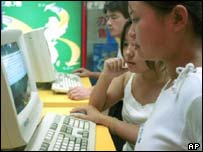BBC: Chinese censor online chat
Last Updated: Monday, 19 May, 2003, 08:05 GMT 09:05 UK
The extent of Chinese Government censorship of what its people say in
online chat rooms has been exposed by Reporters Without Borders.
 |
| Net-based discussion rooms are popular in China |
Messages critical of the Chinese Government either never appear or are purged
from popular chat rooms, a study by the free speech pressure group has revealed.
The study also found that Chinese law enforcement agencies regularly track down
and even jail the authors of the critical messages.
Reporters Without Borders estimates that China employs 30,000 people to watch
what its people are doing online.
Central control
During a month-long study the pressure group tested the surveillance by
repeatedly trying to post messages to popular chat rooms.
Researchers for the group prepared messages rated on a scale of one to 10 for
how provocative they were.

"More people are in prison in China for expressing their views on the
Internet than in any other country in the world "
Reporters Without Borders
Level one messages were innocuous and contained no criticism of the Chinese
authorities. All such messages appeared in the chat rooms.
Level 10 messages were deeply critical of government policy or called for the
release of jailed dissidents. Almost none of these messages showed up in chat
rooms or were removed after a short delay.
More than 70% of messages of level seven or eight, that mentioned sensitive
political topics but were not directly critical, appeared in chat rooms but were
generally removed after a few hours.
Broadly, only 30% of controversial messages made it on to the internet.
Dangerous place
Reporters Without Borders put the censorship down to the fact that any
organisation wanting permission to run a net service business must sign a
"self-discipline pact" that means it agrees to watch what its
subscribers and customers do and say online.
The "self discipline pact" requires net service firms to filter all
traffic in order to censor discussions and weed out messages that mention banned
topics.

"Sars is on a list of words banned in discussion rooms "
As well as messages critical of the authorities, net firms are also required to
control discussions about human rights, Taiwan independence, [...] Sars, the BBC
and the banned Falun Gong spiritual movement.
The report also found that some web firms do a better job of filtering than
others.
None of the controversial messages posted by the researchers appeared on the
Xinhuanet discussion boards but more than 50% appeared on the sina.com.cn
webpages.
This relentless scrutiny is turning chat rooms on popular Chinese websites into
"dangerous traps", warned the pressure group.
The consequences of posting critical messages can be severe.
"More people are in prison in China for expressing their views on the
internet than in any other country in the world," says the report on the
filtering experiment.
One woman, 22-year-old Liu Du, has been in jail since November 2002 for posting
critical messages on discussion boards.
In total Reporters Without Borders estimates that 36 people have been arrested
and jailed for putting controversial [material] online.
http://news.bbc.co.uk/2/hi/technology/3034023.stm